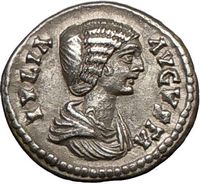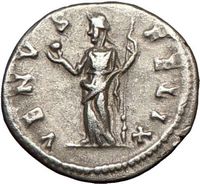Julia Domna Roman Empress, wife of Septimius Severus, mother to Emperors Geta and Caracalla
193-217AD Biography & Guaranteed Certified Authentic Ancient Coins for
Sale to Buy at Trusted Online Coin Shop
Explore authentic ancient
Julia Domna Roman Empress coins that you can actually buy! Yes
you can own real ancient coins of the very infamous ruler today. Every
coin comes with it's own custom-made, unique certificate of authenticity
$50-$100 value, absolutely free, a lifetime guarantee of authenticity,
professional research photograph and history. The best value at an
online coin shop you will find!
 
Authentic Ancient Coin of:
Julia Domna - Roman Empress Wife of Emperor
Septimius Severus: 194 - 8 April 217 A.D. -
Silver Denarius Laodicea ad Mare mint: 196 - 202 A.D.
Reference: RIC IV 646, RSC III 197
IVLIA AVGVSTA, draped bust right.
VENVS FELIX, Venus standing facing, head left, apple in right, scepter
in left.
Venus
was a
Roman
goddess principally associated with
love,
beauty and
fertility, who played a key role in
many
Roman religious festivals and myths.
From the third century BC, the increasing
Hellenization of Roman upper classes
identified her as the equivalent of the
Greek goddess
Aphrodite.
.jpg/350px-La_nascita_di_Venere_(Botticelli).jpg)
The Birth of Venus, by
Sandro Botticelli c. 1485–1486.
Her cult began in
Ardea and
Lavinium,
Latium. On August 15, 293 BC, her
oldest known
temple was dedicated, and August 18
became a festival called the
Vinalia Rustica. After
Rome's
defeat at the
Battle of Lake Trasimene in the opening
episodes of the
Second Punic War, the Sibylline oracle
recommended the importation of the Sicillian Venus of Eryx; a temple to
her was dedicated on the
Capitoline Hill in 217 BC: a second
temple to her was dedicated in 181 BC.
Venus seems to have played a part in household or private religion of
some Romans. Julius Caesar claimed her as an ancestor (Venus Genetrix);
possibly a long-standing family tradition, certainly one adopted as such
by his heir
Augustus. Venus statuettes have been
found in quite ordinary household shrines (lararia). In fiction,
Petronius places one among the
Lares
of the
freedman
Trimalchio's household shrine.
Julia Domna (unknown date–217) was a member of
the
Severan dynasty of the
 Roman
Empire. Empress and wife of
Roman Emperor Lucius
Septimius Severus and mother of
Emperors
Geta and
Caracalla, Julia was among the most
important women ever to exercise power behind the throne in the Roman
Empire. Roman
Empire. Empress and wife of
Roman Emperor Lucius
Septimius Severus and mother of
Emperors
Geta and
Caracalla, Julia was among the most
important women ever to exercise power behind the throne in the Roman
Empire.
Family
background
Julia was of Syrian origin from the ancient city of
Emesa. Her ancestors were Kings Priest
of the famous temple of
Baal. The family lost its kingdom to
Rome but continued domination of the temple of Baal. The family had an
enormous wealth and was promoted to Roman senatorial aristocracy. She
was the youngest daughter of high-priest Gaius
Julius Bassianus and her eldest sister
was
Julia Maesa.
Reign
In the late 180s, Julia married future Emperor
Septimius Severus who himself was in
part of
Punic background. The marriage proved
to be a happy one and Severus cherished his wife and her political
opinions, since she was very well read and keen on philosophy. Together,
they had two sons, Lucius Septimius Bassianus (Caracalla)
in 186 and
Publius Septimius Geta in 189.
Civil
War
When Severus became emperor in 193 he had a civil war
waiting for him, against rivals such as
Pescennius Niger and
Clodius Albinus. Julia accompanied him
in his campaigns in the East, an uncommon event in a time when women
were expected to wait in Rome for their husbands. Nevertheless, she
remained with the emperor and among the several proofs of affection and
favour are the minting of coins with her portrait and the title mater
castrorum (mother of the camp).
Julia now had complete power and ruled behind the
Roman Empire. Many early Romans disliked the fact of her ruling over the
throne when Septimius Severus was at war.
Controversy
and transition of power
As empress, Julia was often involved in intrigues and
had plenty of political enemies who accused her of treason and adultery.
None of these accusations were proven, Severus continued to favour his
wife and insisted on her company in the campaign against the
Britons that started in 208. When
Severus died, in 211 in
York, Julia became the mediator between
their two sons.
Caracalla and
Geta who were to rule as joint
emperors, according to their father's wishes expressed on his will. But
the two young men were never fond of each other and quarrelled
frequently. Geta was murdered by Caracalla's soldiers in the same year.
Caracalla was now sole emperor, but his relations
with his mother were difficult, as attested by several sources, probably
due to his involvement in Geta's murder. Nevertheless, Julia accompanied
Caracalla in his campaign against the
Parthian empire in 217. During this
trip, Caracalla was assassinated and succeeded (briefly) by
Macrinus. On hearing about the
rebellion, Julia chose to commit suicide. Her body was brought to Rome
and placed in the Sepulcrum C. et L. Caesaris (perhaps a separate
chamber in the
Mausoleum of Augustus). Later, however,
both her bones and those of Geta were transferred by her sister
Julia Maesa to the
Mausoleum of Hadrian. She was later
deified.
|